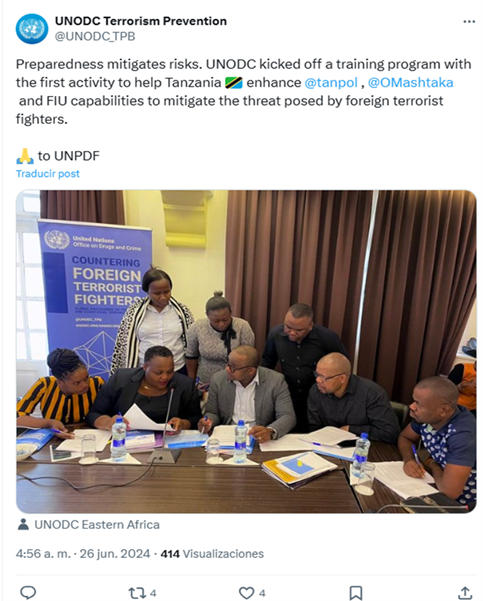Strengthening criminal justice capacities to detect, investigate and prosecute terrorism and foreign terrorist fighters’ offences, through increased knowledge and inter-regional cooperation in Africa, Middle East and Central Asia selected countries
Middle East (regional) - Jordan and Yemen (countries).
Central Asia (regional).
Synopsis
Objectives
The project aims to strengthen the capacity of criminal justice systems, as well as relevant national authorities and institutions, in Africa, the Middle East, and Central Asia. This will be achieved through enhanced knowledge, inter-regional cooperation, and information sharing, with a focus on detecting, investigating, and prosecuting terrorism-related offences, including emerging threats posed by foreign terrorist fighters.
Components
The project includes specialized national workshops for senior criminal justice officials and other relevant institutional stakeholders involved in the detection, investigation and prosecution of terrorist and FTF-related cases; consultation missions, and specialized regional and cross-regional workshops on international cooperation.
Main achievements
The project contributed to capacity enhancement in criminal justice, namely on detecting, investigating and prosecuting terrorism and foreign terrorist fighters’ (FTF) offences, in Africa, Middle East and in several countries in Central Asia. It benefited a total of 136 practitioners from relevant criminal justice and law enforcement agencies.
Regarding support for Jordan, Tanzania and Yemen, dialogue on further capacity-building needs related to threats was facilitated through four national workshops (two in Africa and two in the Middle East), involving 89 participants (including 17 women) from relevant criminal justice and law enforcement agencies. Additionally, two cross-regional coordination meetings were held in Austria and Tanzania for beneficiary countries in East and Southern Africa, with 47 participants from multi-agency delegations, which have further enhanced cross-regional dialogue and the development of relevant skills. These meetings provided, for Eastern Africa, an opportunity to explore emerging FTF threats, examine the current dynamics across both regions, and address the risks associated with increasing operational connections between terrorist groups and the proliferation of the technical knowledge related to the improvised explosive device (IED) manufacturing. For Eastern and Southern Africa, they offered a platform to share information on national and regional threat assessments, discuss best practices, and explore strategic frameworks to address emerging FTF threats and enhance inter regional cooperation.
In March 2025, a “regional expert group meeting on normative and operational challenges related to detection, investigation and prosecution of terrorism and foreign terrorist fighters’ offences in Central Asia” was held in Astana, Kazakhstan. The meeting brought together a total of 52 participants (11 female), from relevant institutions and agencies of Kazakhstan, Tajikistan and Uzbekistan. In May, a regional workshop for Middle East and North Africa was held on “strengthening cooperation to prevent and counter terrorism and foreign terrorist fighters” in Cairo, Egypt, bringing together officials from criminal justice and law enforcement agencies from Algeria, Egypt, Iraq, Jordan, Lebanon, Morocco, the Federal Republic of Somalia, Tunisia, and Yemen.
Impact
This project enhances the capacity of beneficiary countries to prevent and counter terrorism and emerging threats posed by foreign terrorist fighters, while addressing broader challenges related to porous borders, especially those that are ungoverned or beyond the reach of state authorities.

Regional Expert Group Meeting, Astana, Kazakhstan from 11–12 March 2025

